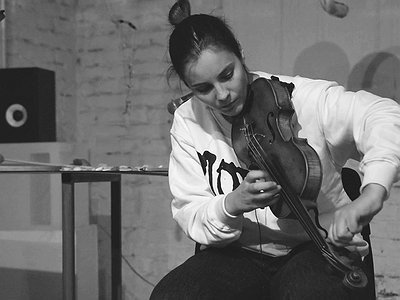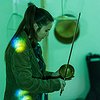Part 2
Where do you find the sounds you're working with? How do you collect, and organise them?
Everywhere I go literally, I record. Sometimes I just listen. I live on an island in the South Adriatic, my sonic imaginarium is saturated by the sounds of the sea. And still, the environment never ceases to surprise with new occurrences and new sonic traits. It is also a historically and culturally very dense area, so I do like to extend the concept of my field recording practice into the interdisciplinary research of the locale.
I proudly use basic field recording equipment. I am very attached to the JrF hydrophone I possess, it is a carefully built instrument rather than a recording tool.
Don’t ask about organisation. If I pop my clogs suddenly and someone opens my hard discs it will be close to reading Dostoyevski on shrooms ... multilingual of course.
Over the course of your development, what have been your most important instruments and tools?
Violin, piano, contact mics, hydrophone, cardboard box, electrical circuits and coils, random rocks, handy field recorder, good headphones, my body and my mind.
I currently work in Reaper.
Could you describe your creative process on the basis of one of your sounds, pieces, or live performances that's particularly dear to you, please?
Water memory – mnemosonic topographies of the Adriatic is definitely something I would like to highlight. It came out as a self-release in March, and it is a project supported by the Ministry of Culture and Media of Croatia. I gathered old and new materials, spanning from at least 7 years of systematic field & hydrophone recording on the island.
I wanted to build a narrative that has a stronghold in prolonged observance of some of the places I am deeply connected with. The 50-minute long ambient piece is a musical journey in 10 “pictures”. I often lean on quasi-cinematic imaginary and abstract “scripting” when composing long forms. Same here, I wanted the listener to experience “stories untold” that will unravel and form in their mind, while the sound composition is only the framework, evocation, atmosphere, and emotional direction. But the listeners are responsible for the story themselves. This might sound like a generalisation and something which happens inevitably in any sound art, my point though is binding the story to a very specific places.
Another important aspect in building the concept around working with prolonged observance is being fully aware that the soundscapes which are captured on the recordings are archives of a dead nature. That is something that field recordists very rarely even mention, but most of the soundscapes that are heavily inhabited with littoral flora and fauna represent their short life cycles. And that is it. Everything non-human in those sounds will soon be dead and this modest creative effort is the only record of their existence.
From there I usually develop the concept in an effort to resolve the additional causes for this process of decay, and I concentrate on the environmental issues, politics of sound and place, and its geoanthropology. From there, I listen to the material extensively, as I am attuning to those moments over and over again. And at the end, I assemble moments / memories rather than sound files, into a composition that already consists of a lot of my mental energy, and it becomes a subtle architecture of mnemonic building blocks.
The poetics of the place are very important to me, too. They define the aesthetic direction and ae tracing the micro-narratives which occur from the details. Once I am concentrated on all these layers of sonic strata, the music composes itself. That is why I often call soundscape composing a self-generative practice. The music already exists in the material.
My job is to peel off the crust here and there and to occasionally translate. And to sit in the Sun on a sharp rock extensively, of course.
In relation to sound, one often reads words like “material”, “sculpting”, and “design”. Do you feel these terms have a relationship to your own work of and approach towards sound? What are the “material” qualities of sound?
A strange coincidence perhaps, but I founded a micro-label in 2017, called sonic matter.
For me, the important creative transition happened in my brain when I started studying physics and was introduced to the work of Nikola Tesla. I was 12 years old. In my child's mind his quotes such as: "If you want to find the secrets of the universe, think in terms of energy, frequency, and vibration," left a big imprint.
Learning that all matter is a form of energy and that everything vibrates and has its own resonant spectrum opened my perception of sound significantly. So the rigid division between living and non-living gradually disappeared, and the concept of “matter“ (in my mind) expanded and is still expanding, I suppose.
So when you ask “What are the “material” qualities of sound?” I say its energy traits and its formative as well as transformative nature. I am very much interested in a body of sound, its geometry, electromagnetic properties, and multidimensionality. The tactile aspects of sound are a wonderful aspect to work with as well.
All this being said, the general conclusion is that all “matter” that exists could be translated into sound. Also, since science proved that sound contains gravitational mass, and since it is concluded that gravitational waves can also be translated into sound, all we need to do is to listen and explore how sound interacts with space(s) – in their permanent and interdependent energy exchange.
Sonic scaffolding is one of my favourite theories about the beginning of life on Earth and probably the most visual theory about the formative potentials of sound. Research in cymatics is giving incredible insights, and it is finding its way into modern medicine as well, such as the recognition of cancerous cells by visualising their dissonant frequencies which can help surgeons identify the margins of a tumour when they are removing it. Therefore, “matter” is sound.
Harmonic progressions and melodic development has often been described as a play with tension and release, with repetition and variation. When working with sound, what guides your decisions?
Well, to take the cue from the previous question possibly energy flow, and deep curiosity about the nature of the sound I am working with, its non-obvious characteristics.
This is largely an intuitive process, but I am certain there is a lot of intellectual decomposing of the musical form I studied in classical music.
Since I am an instrumentalist, there is a great deal of awareness about orchestration, both horizontal and vertical layering.
Tinnitus and developing hyperacusis are very real risks for anyone working with sound. Do you take precautions in this regard and if you're suffering from these or similar issues – how do you cope with them?
My situation is a bit wild.
I started playing violin at the age of 7 and played it extensively for 30 years, so the hearing on my left ear is significantly reduced, as an effect of damage caused by a loud high frequency source being close to it for prolongued periods of time. Add a decade of playing in various symphonic orchestras, and hundreads of electro-acoustic concerts given on loud PA’s when I swithced to improv and experimental performing. And last but not least, for the past 7 years, extensive headphone listening.
Therefore, I appreciate silence a lot. And I am very careful with my ears, that being said I rarely visit loud events any more. Drone and ambient sound are both rewarding and tiring to work with, I put a lot of effort in gently stimulating the inner ear with particular oscillatory patterns, which helps reduce tinnitus. I'm still holding on.
Very specific sounds can be considered as pleasant – as in ASRM – or extremely disagreeable – as in Misophonia. Do you have any experience with this and ideas on the relation between certain sounds and strong emotional responses?
Of course, there is a reason I am deeply attracted to researching the phenomenon of nostalgia in music and the phenomenology of sound and listening in general. Subtle relations between our sensory abilities and bodily memory intrigue me a lot. The famous question – where is the memory stored, gives some hints on why certain sensory triggers can produce strong emotional and overall psychophysical responses.
I think sound digs deep. Sensory regulation is a crucial aspect of neurological development, from the earliest days all the way to the mid-20s. It seems like the school curriculums around the world are paying a bit more attention to this aspect of early development but still I believe a lot more can be done.
As we know, the ear has many functions and is regulating various physiological needs and structures which affect the regulation and development of the brain and the overall nervous system.
We can listen to a pop song or open our window and simply take in the noises of the environment. In which way are these experiences different and / or connected, do you feel?
Do you mean synchronisation? I definitely potentiate that, and often it feels that different sonic layers are synchronising themselves rather than me having full control over the composing process. And I find a great deal of satisfaction when my brain is browsing through different levels of attention, blurring the division between peripheral hearing and focused hearing.
But the general theory of relativity “ruins“ the notion of synchronicity, because what my brain constructs out of the myriad of sounds I hear in a specific moment, yours wouldn’t, depending on your personal psycho-physical state but also the place where you are positioned in relation to the sound sources. Even if we were standing in exactly the same spot, our experience of a certain sound event would be somewhat different.
What we as a contemporary society should be doing collectively is moving away from the manipulative politics of relativity, and finding better ways of attuning to each other, guided by universal human values, rather than self-interest. So, I would rather put my money on attuning – with our surroundings, and even more importantly with oneself.
There is a long way to go for the humans to tap into Nature’s intelligence. But I believe we’ll get there!
Thanks for the wonderful questions, Tobias. Sound is Life!






